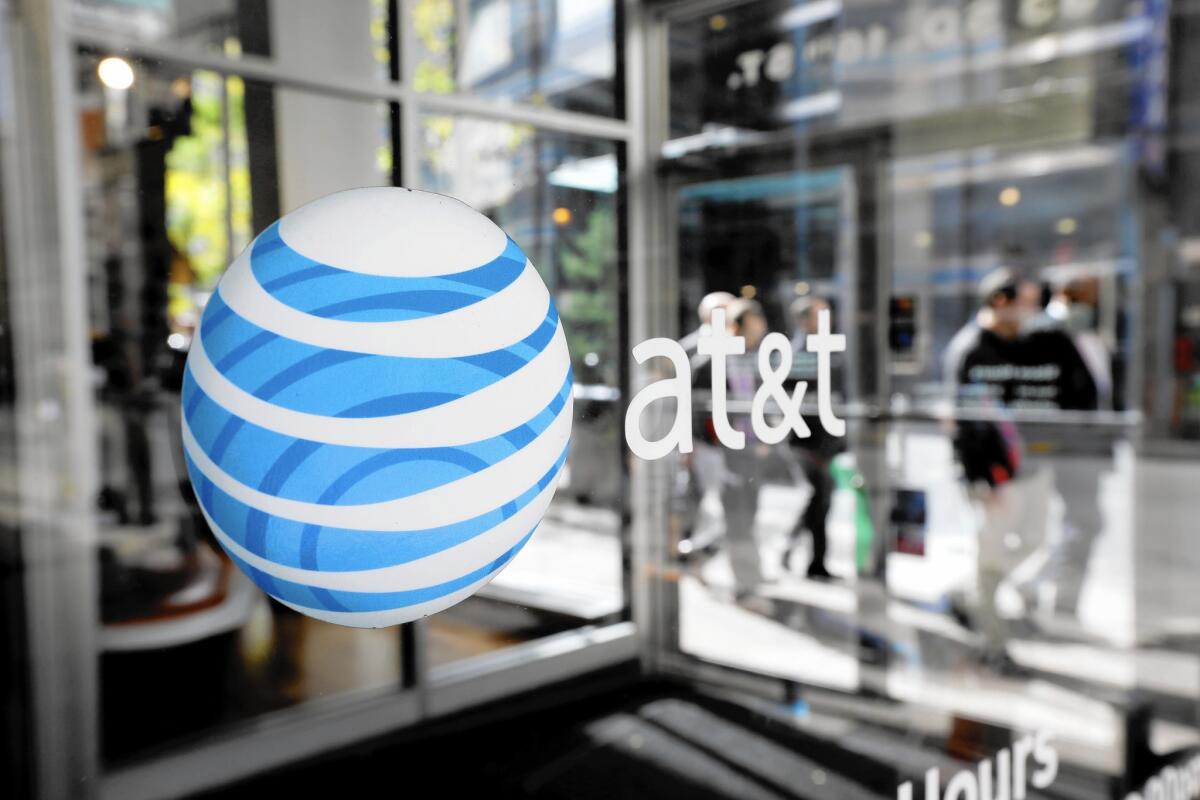AT&T stumbles in helping customer with $24,000 phone bill

AT&T and other businesses with automated billing systems should flag unusual charges for special attention. Above, an AT&T Wireless store in Philadelphia.
It wasnât what Ron Dorff said. It was how he said it.
The 83-year-old Woodland Hills resident wanted to let me know he was having problems with his phone company, AT&T.
I get calls like this every day. But Dorffâs desperation was clear. I could hear it in his voice.
âItâs the bill,â he explained. âThe company says I have to pay it. I canât pay this bill.â
I asked how much it was for.
âTwenty-four thousand dollars,â Dorff replied.
Clearly something screwy was going on.
Such screwiness isnât confined to phone companies. Many large businesses and utilities see billing as a one-way street, with customers responsible for whatever is printed on the statement.
The reality is that businesses also are accountable. They have a responsibility to ensure that customers are protected from egregious or unwarranted charges.
I donât care if Dorff was making daily calls to the International Space Station. The simple fact is that AT&T allowed a customerâs bill to become so over the top as to be laughable.
And when he tried to deal with the problem, he said the phone companyâs response was to dig in its heels: A billâs a bill, so pony up, bub.
This wasnât for a cellphone racking up stratospheric roaming charges, which is usually the case in situations of insane phone bills.
This was for a land line in Dorffâs house, which he uses to access the Internet via an old-school, low-speed AOL dial-up subscription.
Yes, AOL dial-up service still exists. A little checking revealed that about 2.2 million holdouts still have it. Who knew?
Dorff told me he was accustomed to paying about $51 a month to AT&T for Internet access. Then, in March, he received a bill for $8,596.57.
Weâre talking about a man, by the way, who lives off his monthly $1,530 Social Security checks.
âI was shocked,â Dorff told me. âWhat the hell was going on?â
He called AT&T and placed that question to a service rep. The rep couldnât make heads or tails of Dorffâs bill, so she said sheâd send a technician to his house.
âNobody ever showed up,â Dorff recalled. âSo I figured that everything must be OK.â
It wasnât. Dorffâs next monthly bill was for $15,687.64, bringing his total outstanding debt to AT&T, including late fees, to $24,298.93.
If he didnât pay by May 8, the phone company warned, his bill would rise to at least $24,786.16.
Dorff contacted AT&T again, and a service rep once again scheduled an appointment for a technician to visit his house. This time the guy showed up.
âHe said there must be something wrong with my modem,â Dorff said. âAnd that was it.â
He called the phone company yet again. He passed along the technicianâs verdict and asked if AT&T could lower his bill.
This would be the same AT&T with a self-professed commitment to âbuilding strong customer relationships.â
âThe woman said they couldnât make an adjustment,â Dorff recalled. âI told her I couldnât possibly afford what they wanted. She just insisted that I had to pay it. She was very blunt about it.â
Dorffâs next call was to me.
After I got in touch, AT&T wasted little time in deciding it would waive the more than $24,000 in charges.
Georgia Taylor, an AT&T spokeswoman, said Dorffâs modem somehow had started dialing a long-distance number when it accessed AOL, and the per-minute charges went into orbit as he stayed connected for hours.
Taylor said that when the technician visited Dorffâs home, he reset the local dial-up number, so the issue should now be resolved.
But that didnât address the larger question: How come AT&T didnât spot the problem itself and proactively take steps to fix things?
âThis is a rare occurrence, and we address it on an individual basis,â Taylor answered.
She declined to elaborate on whether AT&Tâs billing system is capable of spotting unusual charges and, if so, why it doesnât routinely do so.
Taylor said it was just a coincidence that I called when I did. The company, she suggested, was well on its way toward dropping the charges.
âAt the time of your inquiry,â Taylor said, âthis was still an open item and we were working with the customer to reach a resolution.â
I suppose Dorff just misheard when the AT&T service rep told him heâd have to pay â or else.
Iâm thinking AT&T and others in the business community could use a little nudge.
Perhaps they could take a lesson from banks and credit card companies, which routinely contact customers when fraud is suspected.
How hard would it be for all businesses with automated billing systems to operate similarly, flagging unusual charges for special attention?
Perhaps thereâs a lawmaker out there who sees merit in such a requirement for any company or utility with, say, at least 50,000 customer accounts.
The faster you nip such problems in the bud, after all, the more you limit losses for both the customer and the business.
Or does AT&T want its customers to get into financial trouble?
David Lazarusâ column runs Tuesdays and Fridays, He also can be seen daily on KTLA-TV Channel 5 and followed on Twitter @Davidlaz. Send tips or feedback to [email protected].
More to Read
Inside the business of entertainment
The Wide Shot brings you news, analysis and insights on everything from streaming wars to production â and what it all means for the future.
You may occasionally receive promotional content from the Los Angeles Times.









